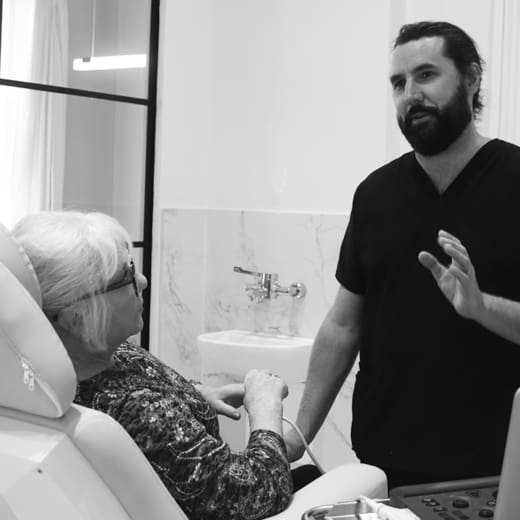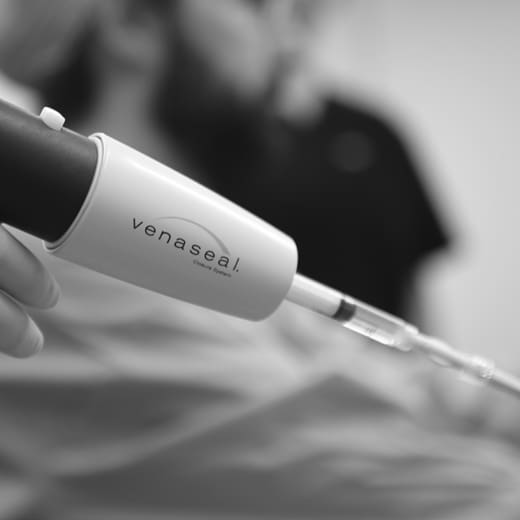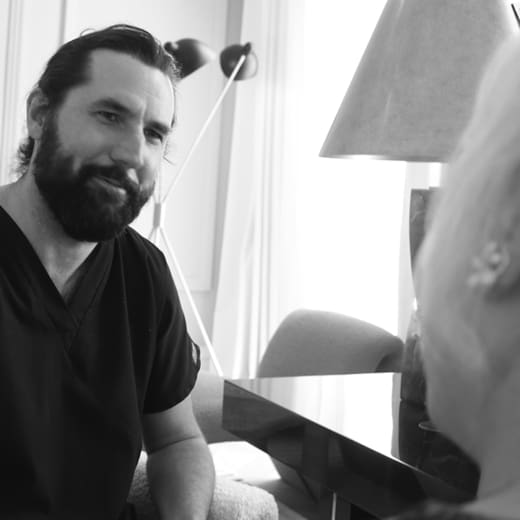McKeown Medical
167 Bath Street, Glasgow, G2 4SQ
Dr Alex Vesey is our expert consultant vascular surgeon who heads up our varicose vein team at McKeown Medical. Here, he discusses which foods to avoid if you have varicose veins.
Date posted — 18.08.24
If you have varicose veins, it’s advisable to avoid foods that can contribute to poor circulation and increased vein pressure.
High-sodium foods, like processed snacks, canned soups, and fast food, can cause water retention, leading to swelling and increased pressure on veins.
Sugary foods and refined carbohydrates, such as sweets, pastries, and white bread, can lead to weight gain, further straining the veins.
Additionally, avoid excessive alcohol consumption, as it can dehydrate the body and affect circulation.
Instead, focus on a healthy, balanced diet and good hydration to support healthy blood flow and vein health.
We offer a range of treatment options for varicose veins including VenaSeal™ – the most up to date method of treating varicose veins that causes less pain and allows you to get back to normal almost immediately, without the hassle of wearing bandages or compression stockings.
Get in touch with our friendly team and we’ll help you find the right varicose vein treatment for you.

Varicose veins are enlarged, twisted veins that often appear just under the skin, primarily in the legs and feet.

When it comes to treating varicose veins, VenaSeal™ has emerged as a revolutionary option that offers a minimally invasive and...

Radiofrequency ablation (RFA) and endovenous laser ablation (EVLA) are two minimally invasive treatments used to effectively treat varicose veins, but...
1 / 3
2 / 3
3 / 3

Varicose veins are enlarged, twisted veins that often appear just under the skin, primarily in the legs and feet.

When it comes to treating varicose veins, VenaSeal™ has emerged as a revolutionary option that offers a minimally invasive and...

Radiofrequency ablation (RFA) and endovenous laser ablation (EVLA) are two minimally invasive treatments used to effectively treat varicose veins, but...
I am very humbled to share these incredible reviews from our patients.
We are very fortunate to have a team who LOVE their work and will always go the extra mile to ensure our incredible patients are properly taken care of at every step of their journey with us.
We couldn’t do what we do without our incredible (and growing!) team and I am so proud of every one of them.
We have some very exciting developments on the horizon, so keep watching this space!

Laser eye rejuvenation! Thank you to our lovely patient for allowing us to share her photos, just one week after her laser eyelid rejuvenation.
Crepe skin, loose skin, wrinkles are all common signs of ageing around the eye which do not respond well to surgery. The optimal treatment for these problems is laser resurfacing - which is exactly what this patient had.
We’ve been performing these treatments in the clinic for several years, although I’ve recently modified the technique to achieve incredible results with less downtime.
What do you think?

Here’s another fantastic result from our phenomenally talented plastic surgeon, @bramhallplasticsurgery .
As we age, the eyebrows naturally descend which allows excess skin to fall into the upper eyelids. The two main surgical options to address this are a brow lift, an upper eyelid lift (upper blepharoplasty) or both, but for many patients the most appropriate option is also the simplest: to leave the brows exactly where they are and address the excess skin at the eyelids alone.
Upper blepharoplasty is a straightforward procedure with scars hidden in the natural eyelid crease, making them very hard to see once healed. Brow lifts are usually more involved, often require a general anaesthetic, and tend to create a more noticeable change to the face.
The aim with upper eyelid surgery is subtle improvement - looking fresher and more rested, without it being obvious that you’ve had anything done.
This 42-year-old gentleman had a bilateral upper blepharoplasty under local anaesthetic and is shown here six months after surgery.
What do you think?

With darker evenings and fewer social engagements, January is a great time to think about treatments which benefit from a little down time or those that will deliver their best results by spring.
Here’s Dr Darren with his top recommendations for treatments to have over the winter months, including Sofwave, HALO, full-field resurfacing and varicose vein treatment, all of which will deliver beautiful results in time for the weather getting better and social calendars filling up!
Which treatments are you planning?

Another year, another round of incredible transformations from our team at McKeown Medical!
Eye bags banished, jowls lifted, skin refined, veins gone. Thank you so much to all of our patients who have allowed us to share their photos with you and thank you to our incredible team who work so hard to take care of every patient who trusts us with their care.
Here’s to 2026 and another year of incredible transformations!

“But Daddies, WHEN is Santa coming? I want to wait up for him!”
Happy Christmas to all, and to all a good night 🎅🏻

Laser rejuvenation of the eye area can be an incredibly powerful tool for the right patients, especially those whose ‘bags’ are more about loose skin and fine lines, like this lovely patient here.
We treated her with full field ablation, which takes around 2 weeks to recover from. Her she is a few weeks later and you can see how much tighter the skin is, the crepey skin has gone and the fine lines have been ironed out. The patient is over the moon.
What do you think?

Eyelid surgery is one of the most popular procedures we do in the clinic. It’s a great fix for hooded eyes! Excess skin on the upper eyelids can not only create a hooded, heavy appearance but often affects the vision too.
Here’s the very talented @bramhallplasticsurgery discussing how upper eyelid surgery (blepharoplasty) can restore a more open, refreshed look by removing the excess skin and subtly redefining the natural eyelid crease. Scars are hidden within the fold of the eyelid, leaving eyes that look brighter, not “done.”
Do you have any questions about surgery? Ask in the comments or send us a message!

Thank you to our patient for allowing us to share her before and after photos of her upper blepharoplasty.
Excess skin on the upper eyelids can make the eyes appear tired or heavy. This simple procedure restores a lighter, more open look while keeping the result completely natural.
Another fabulous result from the very talented @bramhallplasticsurgery!
What do you think?
